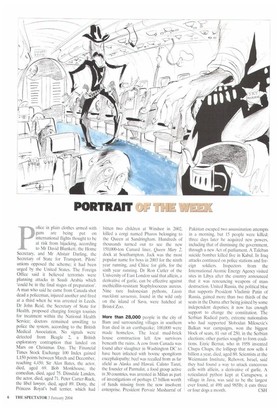p olice in plain clothes armed with guns are being put
on international flights thought to be at risk from hijacking, according to Mr David Blunkett, the Home Secretary. and Mr Alistair Darling, the Secretary of State for Transport. Pilots' unions opposed the scheme; it had been urged by the United States. The Foreign Office said it believed terrorists were planning attacks in Saudi Arabia which 'could he in the final stages of preparation'. A man who said he came from Canada shot dead a policeman, injured another and fired at a third when he was arrested in Leeds. Dr John Reid, the Secretary of State for Health, proposed charging foreign tourists for treatment within the National Health Service; doctors remained unwilling to police the system, according to the British Medical Association. No signals were detected from Beagle 2, a British exploratory contraption that landed on Mars on Christmas Day. The Financial Times Stock Exchange 100 Index gained 1,150 points between March and December. reaching 4,450. Sir Alan Bates. the actor, died, aged 69. Bob Monkhouse, the comedian, died, aged 75. Dinsdale Landen, the actor, died, aged 71. Peter Carter-Ruck, the libel lawyer, died, aged 89. Dotty. the Princess Royal's bull terrier, which had
bitten two children at Windsor in 2002, killed a corgi named Pharos belonging to the Queen at Sandringham. Hundreds of thousands turned out to see the new 150,000-ton Cunard liner, Queen Mary 2, dock at Southampton. Jack was the most popular name for boys in 2003 for the ninth year running, and Chloe for girls, for the sixth year running. Dr Ron Cutler of the University of East London said that allicin, a derivative of garlic, can be effective against methicillin-resistant Staphylococcus aureus. Nine rare Indonesian pythons, Liasis mackloui savuensis, found in the wild only on the island of Savu, were hatched at Bristol Zoo.
More than 28,000 people in the city of Barn and surrounding villages in southern Iran died in an earthquake; 100,000 were made homeless. The local mud-brick house construction left few survivors beneath the ruins. A cow from Canada was found after slaughter in Washington DC to have been infected with bovine srmngiform encephalopathy; beef was recalled from as far afield as Alaska and Hawaii. Calisto Tanzi, the founder of Parmalat, a food group active in 30 countries, was arrested in Milan as part of investigations of perhaps £7 billion worth of funds missing from the now insolvent enterprise. President Pervaiz Musharraf of
Pakistan escaped two assassination attempts in a morning, but 15 people were killed; three days later he acquired new powers, including that of dismissing the government, through a new Act of parliament. A Taleban suicide bomber killed five in Kabul. In Iraq attacks continued on police stations and foreign soldiers. Inspectors from the International Atomic Energy Agency visited sites in Libya after the country announced that it was renouncing weapons of mass destruction. United Russia, the political bloc that supports President Vladimir Putin of Russia, gained more than two thirds of the seats in the Duma after being joined by some independent deputies; it now has enough support to change the constitution. The Serbian Radical party, extreme nationalists who had supported Slobodan Milosevic's Balkan war campaigns, won the biggest block of seats. 81 out of 250, in the Serbian elections; other parties sought to form coalitions. Enric Bernat, who in 1958 invented Chupa Chups, the lollipop that now sells 4 billion a year, died, aged 80. Scientists at the Weizrnann Institute, Rehovot, Israel, said they had found a way to attack cancerous cells with allicin, a derivative of garlic. A reticulated python kept at Curugsewu, a village in Java, was said to be the largest ever found, at 49ft and 9851b; it eats three or four dogs a month. CSH


























































 Previous page
Previous page